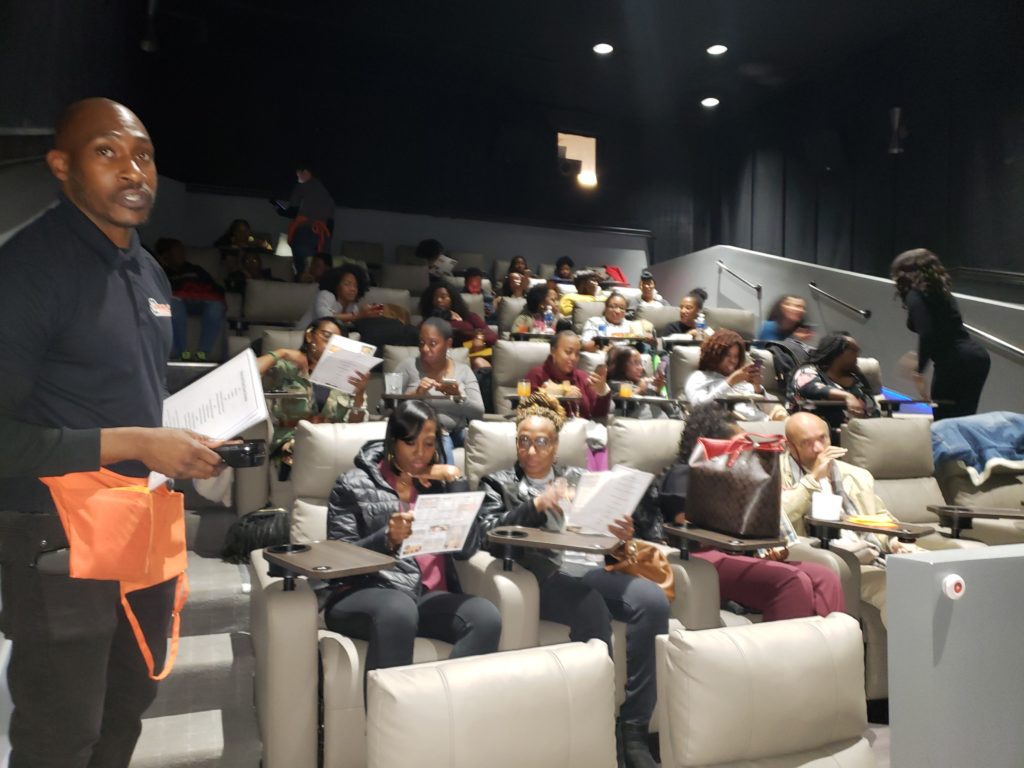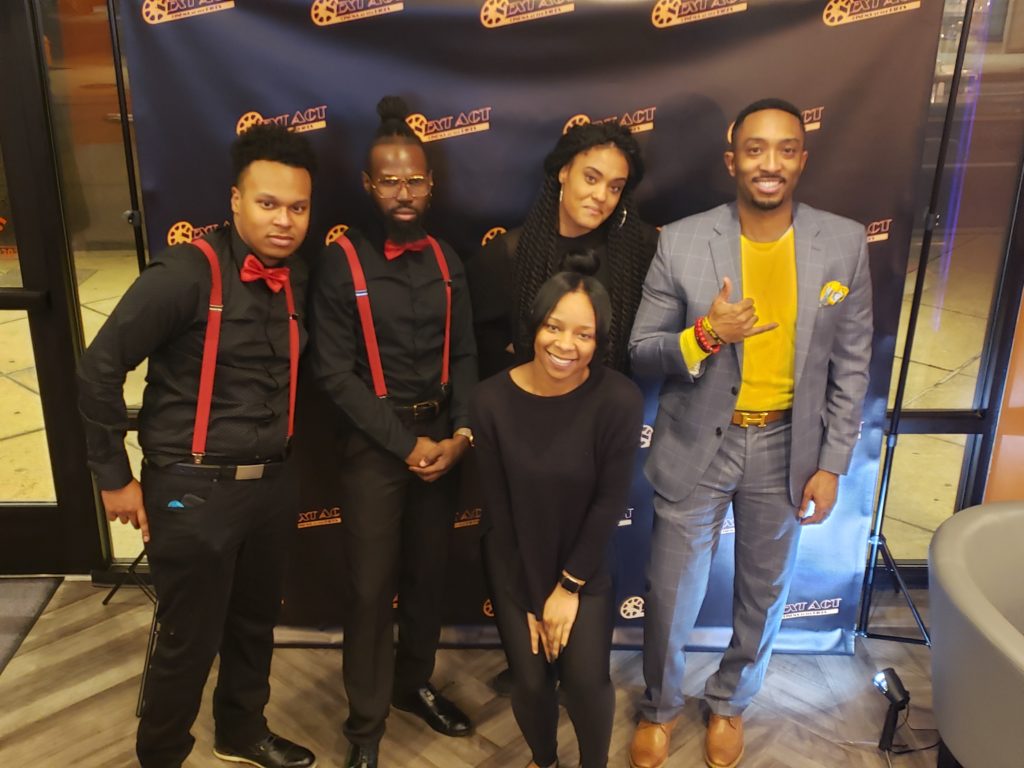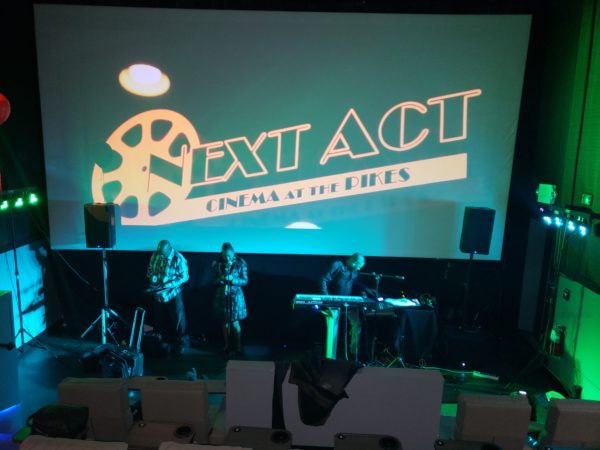In March 2019, Anthony Fykes and Robert Wright opened the doors to Next Act Cinema. Located about half an hour outside Baltimore, the cinema originally opened in 1938 as the art-deco Pikes Theatre. The Pikes closed in 1984, and several changes in ownership followed. By the time Fykes and Wright found what was to become Next Act Cinema, it had been empty since 2016; recalls Fykes, “We weren’t really sure how to build it and structure it so that it would be inviting to the community.”
A year later, and Fykes and Wright had to do just that. Through a combination of thoughtful programming and events, they managed to connect with their community. “Everyone knows that it’s really hard to turn a profit at a movie theater,” says Fykes. But “in our first year, we were doing pretty well. Before Covid hit.”
Key word: Covid. Almost a year to the date after Next Act Cinema opened, they were forced to close—and they remain closed, four months later. The Boxoffice Podcast recently spoke to Fykes about Next Act Cinema in Episode 17 (listen here).
Next Act Cinema is, if not a unique theater, at least pretty close to it, being one of a very small handful of Black-owned theaters in the United States. Minority-owned theaters were more common between 1905 and the 1950s, notes Fykes, when segregation meant that Black audiences would have their own, dedicated theaters. (Not that this was necessarily a golden age of Black-owned theaters; many of them were run by Black managers but owned by white men, and certain cities with high minority populations—including Charlotte and Chapel Hill, NC—never had a dedicated theater for Black audiences.) Former basketball player and entrepreneur Magic Johnson founded his own cinema circuit in the ‘90s, making Magic Johnson Theatres the only Black-owned chain the U.S. at that time; now, those theaters are owned by AMC. Though it’s difficult to get an accurate number as to how many Black-owned theaters currently exist in the United States, Fykes knows of only four others. “A lot of movie theaters,” says Fykes, “don’t want to be in economically underserved communities.”

Next Act is located in Pikeville, Maryland, a Jewish Orthodox community that also has a mix of Black, white, and Hispanic people. As such, it was never Fykes and Wright’s intention to make Next Act a quote-unquote “Black” cinema—clarifies Fykes, “we have to be sure that we’re showing movies that appeal to a wide audience.” The first movie they screened was Captain Marvel, because the timing was right and it was probably going to make a lot of money. Though the duo “didn’t honestly know how people were going to perceive us” when they opened, Next Act Cinema held their own with Captain Marvel “against the AMCs and the Regal that are our competitors in the area.”
For the next movie, something changed that would impact Next Act’s mission and programming strategy going forward. “When Us came out, we couldn’t get it, actually. … And so we had our movie booker basically complain and say, ‘Listen, you have a Black-owned theater showing the movie Us. Why wouldn’t they be able to get it?’ Without going into a whole long drama story, we got the movie literally probably about two days before it was going to be released.”
Next Act Cinema put some social marketing together for Us—“a little more, not much more” than what they’d done with Captain Marvel. And: the floodgates opened. Email and social interactions came pouring in, from moviegoers excited that they could see Jordan Peele’s Us in a theater owned and run by Black men. “There was one guy—I kid you not, he was our influencer, because he put us on the map. I’ll never forget this guy,” says Fykes. “He came in with about three or four friends, and they took a video. And what he said on social media was, ‘We are watching Us inside of us,’ basically.” D.L. Hughley and Steve Harvey reached out to do interviews. Us outgrossed Captain Marvel at Next Act Cinema and “really put us on the map.”
The shift that Us represented in how Next Act could best serve its customer base—not only people in Pikesville, but those driving from Virginia and D.C. to go to this particular theater—is indicative of a piece of advice Fykes gives to aspiring exhibitors: be able to pivot. Fykes and Wright initially thought that Pikesville, being an older community, would like to see classic films like Casablanca and Gone with the Wind. Harlem Nights and Coming to America were also on the docket in those early days. It didn’t work—Fykes estimates that five people total showed up for Coming to America.
“You have to keep your ear to the ground, understanding what your local market is demanding to see” says Fykes. Older films that people could rent for a few bucks at home: not the way. Since that early miscalculation, Next Act Cinema has found success in mixing big Hollywood blockbusters boasting wide appeal with medium-budget, Black-led films like The Banker, Queen and Slim, 21 Bridges, Black and Blue, and Harriet. The Harriet Tubman biopic earned more money for Next Act Cinema than Avengers: Endgame, the highest-grossing movie of 2019.

With dozens of movies coming out each month and only two screens to put them on, picking the right movie can be a matter of “luck,” Fykes admits—but Next Act Cinemas weights the scales in their direction by putting in the legwork to provide experiences around many of the films they program. The theater was decorated in a jungle theme for The Lion King and as the Underground Railroad for Harriet. Shaft and Avengers had people dressing up in cosplay. “We created a boutique-type experience, where the guests would feel part of the movie from the lobby to the big screen…. That’s making us stand out. We’re very focused on doing that, because the community then doesn’t just see us as a movie theater. It’s a destination. They have an experience. They can eat, they can drink, but they also can take pictures with the owner, take pictures with the staff. We decorate it with them in mind.”
Community helped Next Act Cinema even before they opened—Fykes remembers people from local churches coming into lend their expertise on audio/visual tech. Once Next Act Cinema was screening movies, fraternities and sororities would rent out theaters to see Harriet. And even though Next Act Cinema is closed, community remains on their mind now.
“All the things that the country is going through right now with the deaths of George Floyd and Breonna Taylor—we’re a part of that,” Fykes says. As such, last month saw Next Act Cinema host a Juneteenth celebration, something that Fykes didn’t see in the works at any other theater. An outdoor portion of the event got rained out, but inside the theater Next Act Cinema staff acted out their own sitcom, played music, and performed comedy—all viewable to customers sitting at home on their computers. “Juneteenth is supposed to be a celebration. We got so many emails and we got so many thank you’s after we did that,” says Fykes. “As a small boutique theater, even a large theater, you have to be engaged with your customer base.” Theaters and customers need each other, he argues. “We have issues that our community is facing, but then you have an entertainment establishment that’s supposed to be uplifting. That’s what we’re trying to remember. That’s our mission.”
And it’s a mission that—based on conversations Fykes and Wright have had since founding Next Act Cinema—other Black entrepreneurs and movie-lovers would like to get in on. Neither man had experience in the exhibition world before opening Next Act. Wright knew audiovisuals, and Fykes knew operations, but everything specific to running a theater had to be learned. The bank turned them down, so when it came to financing, “we kind of had to figure it out ourselves.”
In 2018, Ava DuVernay took to Twitter to raise awareness of the lack of theaters in communities of color. Two years later, Fykes is unaware of a mentorship program or something similar in the exhibition space that could have helped them, even though “I would have loved to have a mentorship or a roadmap.” Now, Robert and Anthony are considering writing something themselves, “something that would help the next Rob and Tony. Or the next Next Act Cinema.”
Just as Fykes and Wright have an eye on paying it forward within the exhibition community, the community of Next Act Cinema moviegoers now has the opportunity to look out for them. In mid-June, Next Act Cinema launched a crowdfunding campaign on FundBlackFounders.com. Though they were “extremely hesitant” to ask for money at first, they were convinced by requests for patrons that they be able to donate in some way. Another factor: The shutdown was just lasting too long. “What it came down to is, we need to survive this,” Fykes said. So far, they’ve raised about 20 percent of their 50,000 goal, “but I’m happy even at one percent. Because that shows us that people are really interested in keeping Next Act Cinema around.”



Share this post